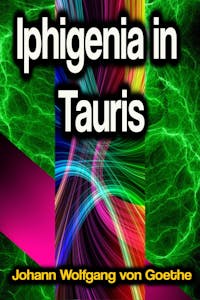Iphigenia in Tauris Johann Wolfgang von Goethe - Beloved by the gods for his wisdom, the demigod Tantalus was once invited to their fellowship. Becoming boisterous whilst celebrating with them, he began to boast, and he stole the gods' nectar and ambrosia, their food of immortality. When the gods came to see Tantalus in turn, he tested their omniscience by offering his own son Pelops to them as their meal. Offended by the deception, the gods banished Tantalus from their community to Tartarus and cursed him and his family. This became known as the curse on the Tantalids, in which descendants from Tantalus in every subsequent generation were driven by revenge and hatred to the killing of their own family members.Thus did Agamemnon, army commander and great-grandson of Tantalus, offer his eldest daughter Iphigenia to goddess Diana (in Greek known as Artemis) to ensure favourable winds for the voyage from Avlida to Troy, where he intended to wage war against Troy. In the mistaken belief that her husband Agamemnon had murdered their daughter Iphigenia, Clytemnestra then killed Agamemnon. As a result, Orestes and Electra, the brother and sister of Iphigenia, harboured a grudge against the mother over the murder of their father, and Orestes, with the help of Electra, murdered his mother Clytemnestra. Being now guilty of a murder, he too fell under the family curse. In an attempt to flee his impending fate of falling victim to revenge and of being killed for his crime, he fled. Consulting the Delphic oracle of Apollo, he was told to bring "the sister" to Tauris and that this would be the only way to lift the curse. Since he supposed his sister Iphigenia was already dead, Orestes assumed that the oracle must have meant Apollo's twin sister, the goddess Diana. He therefore planned to rob the statue of Diana from the temple in Tauris, and he set out with his old friend Pylades for the coast of Tauris.ABOUT THE AUTHOR:Johann Wolfgang von Goethe was a German writer, pictorial artist, biologist, theoretical physicist, and polymath. He is considered the supreme genius of modern German literature. His works span the fields of poetry, drama, prose, philosophy, and science. His Faust has been called the greatest long poem of modern European literature. His other well-known literary works include his numerous poems, the Bildungsroman Wilhelm Meister's Apprenticeship, and the epistolary novel The Sorrows of Young Werther.Goethe was one of the key figures of German literature and the movement of Weimar Classicism in the late 18th and early 19th centuries; this movement coincides with Enlightenment, Sentimentalism (Empfindsamkeit), Sturm und Drang and Romanticism. The author of the scientific text Theory of Colours, his influential ideas on plant and animal morphology and homology were extended and developed by 19th century naturalists including Charles Darwin. He also served at length as the Privy Councilor of the duchy of Saxe-Weimar.
